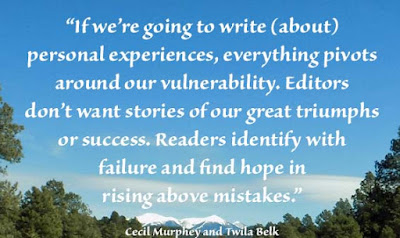A person I respect
and love dearly said one day, “Every family is dysfunctional. Every family.”
I said to myself That
can’t be true.
But within seconds I
realized she was correct. Each family is dysfunctional—each person is
dysfunctional—some in big ways, some in smaller ways.
To complicate
matters, we all have blind spots—we can’t see our own quirks—our malfunctions, aberrations, incongruities,
blips, irregularities, inconsistencies, impairments, or distortions.
I give a huge
shout-out to those who understand they have big or little imperfections as well
as blind spots and who work hard to improve. I applaud you!
To those who are too
proud to admit they could be dysfunctional, Thomas Larson suggests we examine where
we’ve allowed self-delusion to shape our identities and memories (The Memoir and the Memoirist).
It’s easy to identify
those with glaring malfunctions, and we need to write about some of those people
in our memoirs.
But even the most
functional people—the most “together” people—have little glitches that make
them imperfect.
Think about the bosses
you’ve had, people you’ve worked with, people you’ve traveled with, people you’ve
lived with. College buddies, fellow cheerleaders, people you go to church with.
In even the finest of them
you might see glimpses of being:
- controlling/bossy
- impatient
- gruff
- proud
- lacking in self-control
- narcissistic
- stretching the truth
Think about
siblings, parents, grandparents, aunts and uncles, cousins, in-laws, children,
grandchildren. In even the finest of them, you might see hints of:
- being enablers
- having a “poor me” attitude, a victim mentality,
- being touchy/overreacting
- being aloof/underreacting
- snobbish
- bitter and unforgiving
- obsessed/addicted: spending money or eating/drinking/drugging to ease pain
- yielding to peer pressure, longing to fit in
Think of neighbors,
best friends, doctors, bus drivers, CEOs, people who have married into your
family. People in your Bible study or your book club or your writing group. In
even the finest of them you might detect traces of them being:
- unpredictable/unreliable
- cowardly
- gullible
- vengeful
- prejudiced
- judgmental/holier-than-thou
People whose blogs
you follow. Facebook friends, Twitter friends. In even the finest of
them you might see glimpses of them being:
- power-hungry
- overly competitive
- defined by their appearances, accomplishments, possessions
- insecure
- driven
Even people we love
with all our hearts
have at least mild
shortcomings—
spouses, parents,
siblings, kids,
grandkids, in-laws,
best friends.
But here’s the
sobering part: You and I are dysfunctional, too.
All those people we’ve
been thinking about—our bosses, our co-workers, people we’ve traveled with,
college buddies, people we go to church with—they have extended grace upon
grace to you and to me despite our dysfunctions and our blindness to them.
Our siblings,
parents, grandparents, aunts and uncles, cousins, in-laws, children,
grandchildren—they have all extended grace to us despite our offenses.
Our neighbors, best
friends, doctors, bus drivers, people who have married into our families,
people in our Bible study or book club or writing group—they have all extended grace
to us despite our rough edges and flaws.
Since you are
dysfunctional and I am dysfunctional,
let’s recognize the
grace and longsuffering
others have extended
to us.
Let’s be grateful
for their patience and forgiveness,
for the second
chances they’ve given us.
Let’s remember The
Golden Rule,
doing unto others as
you would have them do to you,
or, as it reads in The
Living Bible:
“Treat others as we would
want them to treat us”
(Luke 6:31, Matthew
7:12).
And in The Voice:
“Think of the
kindness you wish others would show you;
do the same for them.”
Let’s write about
them
in the way we’d like
them to write about us.
Let’s offer others grace,
let’s be patient
with them, forgive them,
and give them second
chances in our hearts
as well as
in the way we write
about them in our memoirs.







